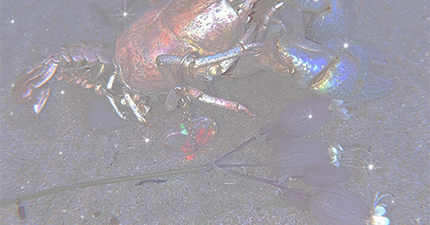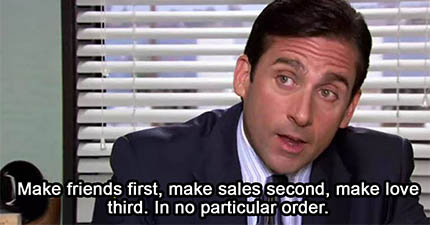I hear it all the time. We live in an era of crisis. Our art and aesthetics have responded to this era of crisis. We live and work in this era of crisis art with artists responding to emergency mobilizations between periods of burn out. None of us feel adequately equipped to “handle” or “manage” a crisis. Who would?
It’s really fucking hard to imagine a future. It’s really, really hard to find a sense of a future that we would want as possible. It’s really hard to trust the future.
Children are our future. It’s corny but it’s also true. It’s not just that children are our only future. It’s that the relationships that we have with kids are about modeling future making.
There’s a huge lie that all of us have been told about the future. The lie is that the future is predictable.
Octavia Butler writes about this. She says that in pessimistic times, our models of the future will look bleak. In optimistic times, our models of the future look victorious. She says that our ideas about the future aren’t really about the future but about the present.
The technological world invests heavily in one idea of the future and this idea of future is really just a model of the present. Recently, billionaires have been giving a huge amount of money to artificial intelligence as a new industry. The idea is that artificial intelligence is an innovation that will bring us into the future.
Recently, I read an article about the use of artificial intelligence in Gaza. One IDF program, called Where’s My Daddy? specifically follows targets and strikes them when they return home to their families. The margin of error allowed for every missile fluctuates but, at its most lenient, the algorithm allows a hundred people to be killed in order to target one individual. Many of the people who algorithms allow militants to kill are children. Billionaires have been pouring money into algorithms. These algorithms give soldiers permission to kill children.
This is very perverse. We are sold this progressive image of technology. It’s innovative and it brings us into the future. But what are we using this supposedly innovative technology to do? We are using it to kill children. Children are the future. We use innovation, progress, to kill our own futures.
No wonder it’s so hard to imagine and to trust the future. We are using progress to slaughter the future.
This is what is going on but I keep coming back to this question—why?
Octavia Butler wrote that our models and statistics of the future aren’t really about the future at all but about the present. Models and statistics about the present don’t incorporate the element of change. Pessimistic times don’t remain pessimistic. Things can change. People aren’t always who they are in the present. People can change. What do models and statistics really do? They make us believe that change is impossible. They replicate the present unto our idea of the future, implying that the future can be predicted, in order to uphold the status quo.
There are people who we share our world with who trust an algorithm more than a child. I’m not even shitting you. People like this exist. Think about how people justify the slaughter of children in Gaza. “These kids are indoctrinated.” What? That just means that you don’t trust them. Children can’t be indoctrinated into anything. Tell a kid that the sky is blue and they’ll make up their own reasons why.
There are people who trust algorithms more than kids. Why not? Algorithms are predictable. They do what you tell them to do. They require no nurture, only input. Children are not predictable. They never do what you tell them to do and they require unending devotion. You can get rid of an algorithm when it’s not working out for you but you’re stuck with a child. You can program an algorithm but you can’t program a child.
Teresa Montoya, in her essay From Trust to Trustworthiness, highlights the way settlers place our trust in water infrastructure rather than water itself. I think that Montoya’s work is incredibly relevant to the question of why some people find it easier to trust an algorithm rather than a child, why people trust the present more than the future and the status quo rather than change. Settlers have benefitted from water infrastructure redirecting water from indigenous communities. We benefit from control even when that control destroys life.
ChatGPT is stationed in the middle of the Mississippi watershed because it requires so much freshwater to run. Just to train ChatGPT 4, OpenAI used 6% of Des Moines’s freshwater. This is during a global water crisis. Why? To make our work more efficient? We are still paid by the hour. What does it mean when we sacrifice our rivers to an equation? Tech people spend a lot of time worrying about whether AI can become sentient or mimic sentience. Guess what? Children are already sentient. Rivers are too. They are alive just like everything that lives in them.
This is what Octavia Butler writes about prophecy: “So why try to predict the future at all if it’s so difficult, so nearly impossible? Because making predictions is one way to give warning when we see ourselves drifting in dangerous directions. Because prediction is a useful way of pointing out safer, wiser courses. Because, most of all, our tomorrow is the child of our today. Through thought and deed, we exert a great deal of influence over this child, even though we can’t control it absolutely. Best to think about it, though. Best to try to shape it into something good. Best to do that for any child.”
Here’s what I know about children. They surprise you. They say surprising things and they do surprising things. We trust children not because we want to but because we have to. Children are the future. They are the ones who inherit this world.
This is what I know about prophecy. Prophecy doesn’t create a prediction of how things will go. Prophecy is a story that tries to change our future. Prophecies are never obedient. You can’t program a prophecy into being. You can only invoke one only once you have given something living enough time and devotion.
The work of prophecy making is about guiding but ultimately about trusting life. Prophecy making is about nurturing the future into being. Prophecy is continuously surprising because it tries to navigate change. Many times, people make a prophecy because they hope to be wrong. Many of us make up prophecies about children, hoping to give them guidance, whether that looks like telling a kid that they will be a superstar, telling one that they’re going to marry one person for their whole life, or telling one that they are just like their father. Much of the time, our prophecies are most useful when they are proven wrong.
You make up a story about who a child will be? You better hope that you are wrong. If you are somehow right and not wrong then I would be worried about the life force of the child in question.
The future isn’t expendable or exchangeable. You can’t get rid of it the way you can get rid of an equation. The future requires your devotion the way a child needs constant attention. The future has never been a statistic or a model and you can’t predict it using the status quo because it is created using the principle of change. The future, like children and rivers, is alive.
I think that, when we don’t trust the future, we replicate the status quo in its place. We use our models that predict the present to kill the future en masse. We kill our future, saying that the children are indoctrinated, because algorithms obey while children do not. Is it possible to trust the disobedient future? For as long as people have been having kids, we have been putting our trust in unpredictable people. Maybe we have been doing it for so long that we have forgotten how. Remembering how is also the work of prophecy.
1 of 211
>>>


